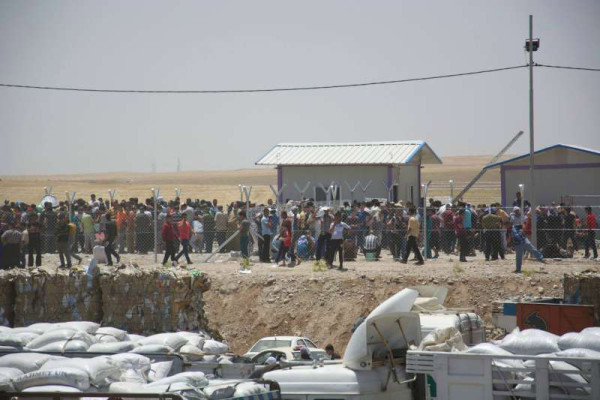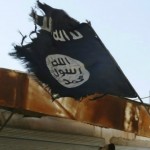Marches of Folly
by James Russell
Painful as it is to watch black clad Sunni extremists marauding their way through Mosul — a city that Americans died defending — we should all be required to take a dose of the images and the poor Iraqi refugees fleeing for their lives.
The fall of Mosul to these armed, dangerous thugs and their nihilistic, anti-modern ideology serves as a monument to the US’ folly in Iraq and the flawed assumptions and false optimism that led us into the quagmire. The very jihadist terrorists that once flocked to Iraq to spill American blood have apparently routed the Army built by the United States.
Those on the far right of the US’ own politics leading the chants for more war with Iran, Russia or whatever international “bad guy” adversary they can conjure up should take note of the unintended consequences of starting wars in far off places where they (and we) do not understand the political fissures bubbling just below the surface of these societies.
The Islamic State of Iraq and the Levant (ISIL or ISIS) and its militia driving around in Toyotas cannot conquer Iraq, but they can certainly split apart what’s left of the country and create another vast area of violence and chaos that will see much of the former Sykes-Picot mandate territories become havens for terrorists and jihadists. Indeed, photographs surfaced yesterday purportedly showing ISIS fighters bulldozing a berm dividing Iraq and Syria.
Onto the strategic blunder of the US invasion of Iraq, however, has been layered yet another and perhaps even more serious blunder by America’s erstwhile allies in Riyadh and other Gulf States. As the US rightfully resisted pressure to intervene in the Syrian civil war, these countries have poured weapons and money into the fray that have in no small measure helped create the forces of darkness now spreading like a cancer across the Middle East’s landscape.
Where once there was a fleeting vision exemplified by Egypt’s Tahrir Square protests of a region with pluralistic democracies working out their differences at the ballot box, we now see the triumph of the forces of counter-revolution engineered by the mukhabarat states and their security services.
We’ve seen a version of this movie before, as the Saudis in particular chose to export their fundamentalist religious ideology overseas to spawn violent resistance groups around the globe.
The West chose to join forces with Saudi Arabia in Afghanistan in the 1980s because the alliance suited its purposes. Today we are left with the Taliban, the Haqqani network, and a host of other malign groups taking up arms in support of Islamic extremist political objectives. Soon these groups will be settling scores with another Western-created army and regime in Kabul.
Therein lies the broader strategic blunder of America’s regional allies, the Sunni mukhabarat states. The war has come home to the Middle East, just as Bin Laden and Sayyid Qutb foresaw. Their strategic objective was always a war against the near enemy — the corrupt regimes that had been created in the aftermath of colonial occupation.
Qutb’s enemy was Nasser — an effete, charismatic leader that tried to make his countrymen believe in Arab nationalism. Bin Laden’s enemies were in the House of Saud, who he saw as corrupt leaders propped up by the United States that had turned their back on their religion and lost their right to serve as protectors of the holy sites of Islam.
Saudi Arabia always straddled the political fence in this fight — choosing to crack down at home, while sending its religious and ideological radicals abroad to fight in the name of their religion. Now, however, those radicals are on their doorstep driving in pickup trucks with weapons paid for in Riyadh careening towards Baghdad and a clash that may prompt Iranian intervention to save the Shia government in Baghdad.
In Cairo, the calculus and political context is different, but of one thing we can be sure — the associates of Sayyid Qutb and Ayman Al-Zawahiri that have been temporarily driven underground by the military dictatorship are keeping their powder dry for future contingencies.
This returns us to America’s march of folly in Iraq and another of the searing and painful ironies of its ill-fated war. Those that may eventually be consumed by war have themselves brought the war against the near enemy home into the Middle East. The forces of Islamic extremism are now eating away at the foundation of America’s two twin pillar partners — Saudi Arabia and Egypt. America’s third pillar in Israel is itself beset with its own religious fundamentalists.
The United States long ago threw in its lot with the states that are now seen (at least in the Gulf) as global entrepots. In Saudi Arabia, the US has helped build the myriad internal security services designed to protect the regime. In Egypt, the US became the principal benefactor of Egypt’s army — now seen as the anchor of Egyptian politics.
The strategic choice facing the United States with the fall of Mosul goes far beyond the fate of the Maliki government in Iraq, which may be forced into reaching out to Tehran to rescue it from the Sunni militia. Instead, Washington will have to decide whether to continue doubling down on its bets in Riyadh and Cairo and their rotted foundations.
It is a bet and a policy choice with no attractive options. In the best of all possible worlds, the Sunni states should band together with the Maliki government to jointly restore order in Iraq. But the Iranians (and the Iraqis) likely would not support such measures — even if the Sunni states could deploy such a multinational force into the field to drive back the black-clad fighters. This is also beyond the US; capacities to resume its role of policeman in Iraq; the idea of calling in airstrikes via planes or drones is ludicrous.
Instead, what we are left with is a violent and anarchic struggle in which the people of these places will pay the ultimate prices as families are uprooted and young men go off to war and death.
The bitterest pill of all is the realization that we all better hope that the mukhabarat states win the fight against the extremists and are not themselves consumed and overthrown in the process.
Photo: Iraqis fleeing violence in Mosul arrive in the Kurdistan region on June 11. Credit: UNHCR/I. Colijn






So why are Bush Junior and Blair not standing in the dock of the International Criminal Court?
Why – of course – they refused to recognise it; good for them – and no one else.
Who said crime does not pay? In their case, crime has paid out extremely well for them.
How much has all this cost, Norman? Try $17 Trillion federal debt as a figure, which – of course – does not begin to include the human and material costs to Iraqi, US, UK and other citizens.
Does all this mean that the US, UK and other world “powers” will learn a lesson in humility?
I doubt that very much. Don’t hold your breath waiting for any pearls of wisdom from these clowns.
Where will all this end? I really don’t know, but one thing the US, UK and other states should try doing is to leave the local people to decide on their own destinies. As long as they pose no direct threat to us or our countries, we should just leave them to get on with deciding their own futures.
What ever happened to national self-determination as an organising principle?
It’s a (predictable) disaster!
Now the Islamic world know that they can beat the fascist West and its proxies. They will conclude that Allah is indeed on their side. This propaganda victory for the jihadists should not be under-estimated.
It is time for us to retire our old imperialist farts, with their bankrupt political and economic philosophies.
Before we uncork all the anti-West vitriol, let’s remember that sectarian hatred and fighting between Sunni and Shia has been around a long time before the West ever got involved in the Middle East. Maliki made his own bed when he went all in with Iran, tossed out the Sunni and Kurd partners in government, let allowed Iraq to be used as a supply route for Iran to ship arms to Assad forces fighting the very Sunni insurgents taking over Iraq now. If you want to blame the West for anything, you could blame Obama for punting on his red line decision in Syria which set the stage for Assad’s forces to push the Sunnis into Iraq where they rearmed and refitted and went after weaker Iraqi forces.
Your assumption that the overthrow of Assad would be good thing is wrong.